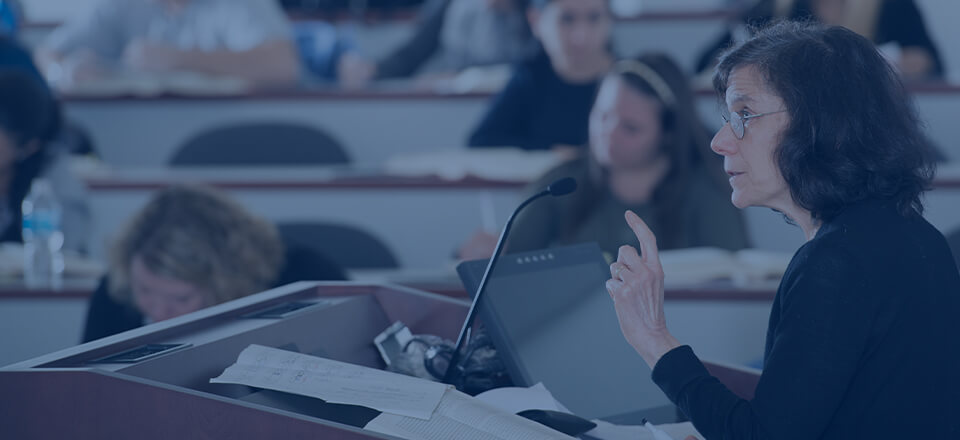About
Anthony Farley Delivers Lecture
November 19, 2009Central Islip, NY – Anthony Farley, a former US attorney, professor at Albany Law School and the 11th holder of the Haywood Burns Chair in Civil Rights at CUNY School of Law, specializes in Constitutional Law, Criminal Procedure and Legal Theory. On the tenth anniversary of his Touro Law Review article, “Thirteen Stories,” he visited Touro Law to deliver a lecture “Abolition: A Call to the End of Prison.”
Farley's work in legal theory and constitutional law has appeared in chapter form in After the Storm: Black Intellectuals Explore the Meaning of Hurricane Katrina (Troutt ed., The New Press: 2006); Cultural Analysis, Cultural Studies & the Law (Sarat & Simon eds., Duke University Press: 2003); Crossroads, Directions & a New Critical Race Theory (Valdes et. al. eds., Temple University Press: 2002); Black Men on Race, Gender & Sexuality (Carbado ed., NYU Press: 1999); and Urgent Times: Policing and Rights in Inner-City Communities (Meares & Kahan eds., Beacon: 1999). His work has also appeared in numerous academic journals, including the Yale Journal of Law & Humanities, the NYU Review of Law & Social Change, the Cardozo Law Review, Law & Literature, and the Michigan Journal of Race & Law.
In addition, Farley has conducted the reading group - Changing Lives Through Literature - composed of people convicted in the Dorchester District Court. The ten-week course culminates with an in-court graduation ceremony and a reception for participants, friends, relatives, and alumni. Participants have included judges, probation officers and other court personnel, alumni, and even prosecutors. The syllabus includes authors from Frederick Douglass to Primo Levi to Dorothy Day. His efforts have been profiled in David Holmstrom, Staying Out of Jail with Books' Help: Massachusetts Lowers Recidivism by Helping Repeat Offenders Discover the Power of Literature, The Christian Science Monitor, May 30, 1995, at 13.
Farley is a member of the Society of American Law Teachers and previously served as a member of its Board of Governors. He is a member of the Lawyers Committee for Civil Rights and a previously served as a member of its Board of Directors. He is a member of the Board of Directors of the Center for Public Representation. He is also a member of the American Philosophical Association.
In 2005, the Boston College Black Law Students Association honored him as the first recipient of The Anthony P. Farley Excellence in Teaching Award, an annual teaching award bearing his name. In 2003, he was the recipient of a residential fellowship with the Humanities Research Institute of the University of California.
Farley's work in legal theory and constitutional law has appeared in chapter form in After the Storm: Black Intellectuals Explore the Meaning of Hurricane Katrina (Troutt ed., The New Press: 2006); Cultural Analysis, Cultural Studies & the Law (Sarat & Simon eds., Duke University Press: 2003); Crossroads, Directions & a New Critical Race Theory (Valdes et. al. eds., Temple University Press: 2002); Black Men on Race, Gender & Sexuality (Carbado ed., NYU Press: 1999); and Urgent Times: Policing and Rights in Inner-City Communities (Meares & Kahan eds., Beacon: 1999). His work has also appeared in numerous academic journals, including the Yale Journal of Law & Humanities, the NYU Review of Law & Social Change, the Cardozo Law Review, Law & Literature, and the Michigan Journal of Race & Law.
In addition, Farley has conducted the reading group - Changing Lives Through Literature - composed of people convicted in the Dorchester District Court. The ten-week course culminates with an in-court graduation ceremony and a reception for participants, friends, relatives, and alumni. Participants have included judges, probation officers and other court personnel, alumni, and even prosecutors. The syllabus includes authors from Frederick Douglass to Primo Levi to Dorothy Day. His efforts have been profiled in David Holmstrom, Staying Out of Jail with Books' Help: Massachusetts Lowers Recidivism by Helping Repeat Offenders Discover the Power of Literature, The Christian Science Monitor, May 30, 1995, at 13.
Farley is a member of the Society of American Law Teachers and previously served as a member of its Board of Governors. He is a member of the Lawyers Committee for Civil Rights and a previously served as a member of its Board of Directors. He is a member of the Board of Directors of the Center for Public Representation. He is also a member of the American Philosophical Association.
In 2005, the Boston College Black Law Students Association honored him as the first recipient of The Anthony P. Farley Excellence in Teaching Award, an annual teaching award bearing his name. In 2003, he was the recipient of a residential fellowship with the Humanities Research Institute of the University of California.
XXX
Touro College Jacob D. Fuchsberg Law Center’s 185,000-square-foot, state-of-the-art facility is located adjacent to both a state and a federal courthouse in Central Islip, New York. Touro Law’s proximity to the courthouses, coupled with programming developed to integrate the courtroom into the classroom, provide a one-of-a kind learning model for law students, combining a rigorous curriculum taught by expert faculty with a practical courtroom experience. Touro Law, which has a student body of approximately 750 and an alumni base of more than 5,000, offers full- and part-time J.D. programs, several dual degree programs and graduate law programs for US and foreign law graduates.
Patti Desrochers
Director of Communications
(631) 761-7062
Fax (631) 761-7069
pdesrochers@tourolaw.edu

